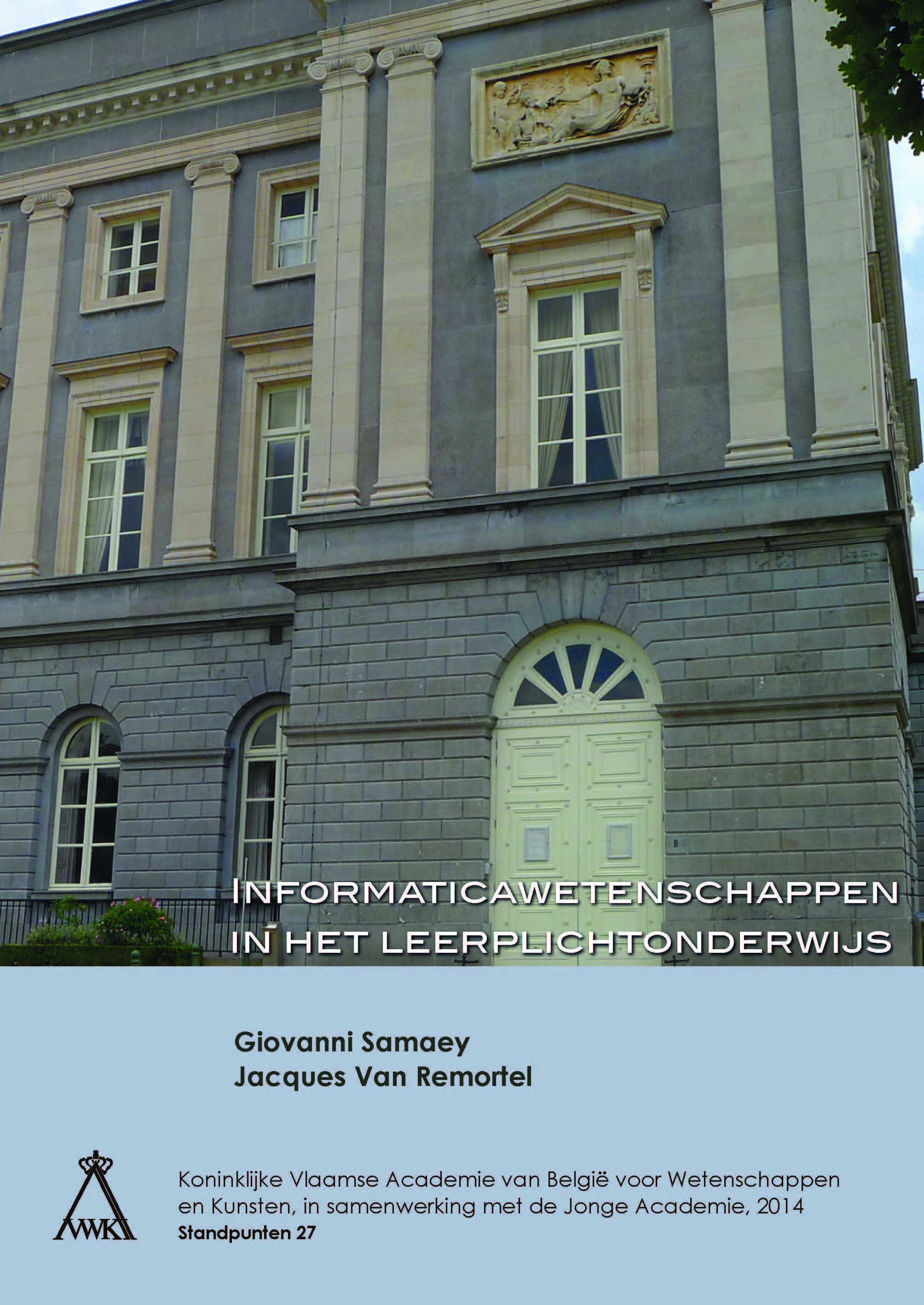Computer Science at School

In the past decades, a digital revolution has taken place. Whereas
grandparents sometimes have to make their first steps towards the
computer, professionally active people use the computer daily, and
children grow up with a smartphone or a (tablet-)computer within reach.
Moreover, children usually manage to work with these devices without
reading a manual. In elementary school, children already learn to use
computers to look for information, to process it, and to verify the
accuracy and the reliability of the obtained data. Impact on privacy and
the risks connected to an online presence are also discussed.
Learning
to use computer tools is evidently of vital importance. There is however
much more to be learned! All children should be able to follow the fast
technological evolution of informatics. To this end, they should learn
to understand the underlying working principles of informatics and
acquire an insight into the concepts that form the basis of these
technologies. Additionally, there is a need for a sufficient number of
young people that are able to steer this technological evolution,
implying that they are both willing and able to create new technologies.
Both objectives require a substantial amount of computer science in
compulsory education. However at the moment, the existing and limited
education in computer science in the elementary and secondary schools is
based only on the enthusiasm of politicians, educational institutes and
teachers of various disciplines. This has resulted in successes but,
unfortunately, also in failures. The education in computer science has
to be reformed in a structured manner. To this end, there is a need for
well-qualified teachers and a solid and well-maintained computer
infrastructure in schools. When these conditions are met, training in
computer science in elementary and secondary schools can be an excellent
preparation for more advanced curricula in computer science in colleges
and universities.
The KVAB (Koninklijke Vlaamse Academie van
België voor Wetenschappen en Kunsten – Royal Flemish Academy of Belgium
for Science and the Arts), through its “Klasse van de Technische
Wetenschappen” (Class of the Technical Sciences), and the “Jonge
Academie” (Young Academy) have created a working group, called
“Informaticawetenschappen in het Leerplichtonderwijs” (Computer Science
in the Compulsory Education). The assignment was to analyze the current
situation and to formulate recommendations to politicians, top managers
in the educational institutes, academics, members of the business
community and interested citizens. The work of this working group has
resulted in the present report, in which two major recommendations and a
series of derived recommendations can be found. The two major
recommendations are:
Recommendation 1
Both in
elementary and secondary education, a strong curriculum of computer
science has to be adopted in compulsory education. The planned education
reform offers a unique opportunity to do this. (See Chapter 3)
Recommendation
2
To offer respectable education in computer science, the
training of the teachers has to be adapted with respect to content and
made more attractive. At the same time, in-service training of the
existing teaching staff has be implemented, both in the short and long
term. (See Chapter 4.4.)
It should be clear that this report does
not deal with the teaching of traditional courses with the support of
computer tools, but with the teaching of computer science as a basic
course, similar to mathematics, physics, etc. After all, computer
science has become an autonomous discipline with its own way of thinking
and own basic concepts. Moreover, the acquired skills are clearly
transferable to other STEM domains. The report argues that every young
person has to become “digitally literate” and “digitally fluent” and
able to think “computationally”. This digital fluency provides
fundamental knowledge, and a skill and attitude that will help the young
grown-up to contribute to society in both a professional and a private
context. Moreover, we should offer the opportunity to every interested
young person to deepen their knowledge in computer science. This
provides an important and increasingly vital value for higher education
in STEM curricula, including computer science. The KVAB and the Young
Academy are not the only academies that have taken the initiative to
analyze the current situation and make recommendations. The discussion
in the working group
is not limited to Flanders. Our neighboring
countries, the United Kingdom, France and the Netherlands, have already
performed a similar analysis, and have written a report with their
findings. The recommendations in these reports are similar to ours. This
convergence shows that the line of thought and the conclusions may be
called “universal”. One should not be surprised that the recommendations
in this KVAB report bear close resemblance to those of the neighboring
countries. If Flanders aspires to become a knowledge society that
belongs to the leaders of the digital world then we need a fast and
powerful reform of the curriculum in computer science in compulsory
education. We hope that our politicians will appreciate and strongly
support our message.
Available documents
Author
-
Giovanni Samaey
-
Jacques Van Remortel


